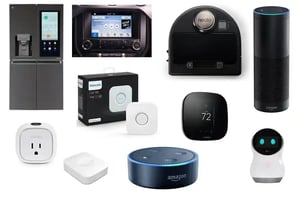What can sales teams learn from people's use of Smart Home devices?
Competition at Home - A Look at the Connected Home Market

This week marks Apples now infamous World Wide Developer Conference. Amongst other announcements, Apple announced their push into consumer products for the connected home. This came in the form of their connected home platform HomeKit’s, own iOS application. This application will allow users access to control any compatible devices. Currently this list includes many major IoT product manufacturers such as; ConnectSense, NanoLeaf, and Phillips with many more partnerships announced this week and at various conferences (see: DigitalTrends).
This announcement coincides with the news that Apple is allowing accessibility to Siri’s features for application developers via an API. This will not only unleash the full functionality of the iPhone to developers but will also allow Apple to push into a space largely dominated by Amazon’s Echo suite of products. All of this new functionality will be released with iOS 10, some time in September.
Now, many people knew this knew this news was coming, including their fierce rivals in the space, Google and Amazon. Each with their own platforms, Home and Echo, respectively. Amazon was able to be first to market, which has its advantages, and disadvantages. The Echo has been on the market for over a year now and has seen consistent growth, seen through the gradual eating up of the wi-fi connected speaker market previously dominated by Bose and Sonos (actual sales figures are not public). This has allowed them to garner the attention of the early adopters in the IoT world. However, the majority of consumers still associate Amazon with being an Ecommerce platform. What will happen when the two major US tech companies come out with their own home-unifying platform?
Google’s soft launch date of their device is November, around the same time that iOS 10 will be released. Keep an eye out in the Fall, as more and more devices go to market, the connected home space will become a crowded market. There is the need of a unifying force. With so many connected devices being offered, each with their own applications, a central platform has to be created. Without this platform the IoT will not be fully adopted in the home, as more and more devices are connected, confusion will rise and eventually lead to a decrease in sales for connected products. The competition between Google, Apple, and Amazon in this space will drive the best possible consumer experience and allow for flexibility in developer platforms.
The true question is, will one of these platforms come out on top? Or will we have a situation like the video game vertical, where Microsoft and Sony split market share 50/50. The idea of platform exclusivity is very much a reality (see: Google’s Purchase of Nest Labs for over $3 Billion) so will we see people purchasing more than one home-unifying device for access to certain product? And how will that affect voice commands, the devices consumer value proposition?

